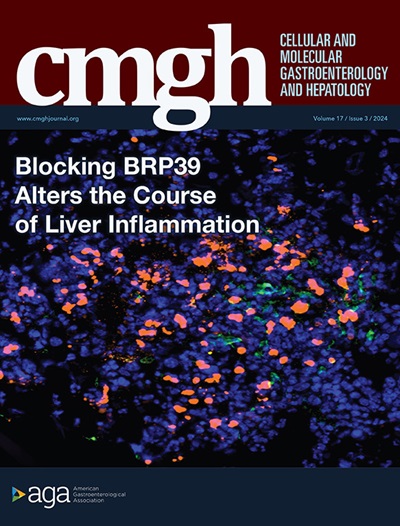XBP1 facilitating NF-κB-p65 nuclear translocation promotes macrophage-originated sterile inflammation via regulating MT2 transcription in the ischemia/reperfusion liver.
IF 7.1
1区 医学
Q1 GASTROENTEROLOGY & HEPATOLOGY
Cellular and Molecular Gastroenterology and Hepatology
Pub Date : 2024-09-11
DOI:10.1016/j.jcmgh.2024.101402
引用次数: 0
Abstract
BACKGROUND & AIMS XBP1, most conserved transcription factor of endoplasmic reticulum (ER) stress, plays important roles in physiological and pathological settings and has profound effects on disease progression and prognosis, so it's necessary to investigate XBP1 in macrophage-originated sterile inflammation during liver ischemia/reperfusion injury (IRI). Macrophage XBP1 expression and liver injury are analyzed in patients undergoing ischemia-related hepatectomy. METHODS A myeloid-specific male XBP1-knockout (XBP1M-KO) strain is created for function and mechanism of XBP1 on macrophage-derived sterile inflammation in murine liver IRI with in-vitro parallel research. Macrophages co-cultured with hypoxia-treated hepatocytes are applied to investigate impact of XBP1 in vitro, with analysis of RNA sequencing and databases. RESULTS Clinically, macrophage XBP1 expression significantly increases in ischemic liver tissues and positively correlates with liver injury after hepatectomy. Less hepatocellular damage is presented in XBP1M-KO mice than in XBP1-proficient (XBP1FL/FL) controls. In vitro, XBP1 deficiency inhibits sterile inflammation and migration in macrophages co-cultured with hypoxia-treated hepatocytes. Analysis of RNA sequencing and databases determines Metallothionein 2 (MT2) as XBP1 target gene, negatively regulated by binding with its promoter. XBP1 deficiency increases MT2 and IKBα expression, but inhibits NF-κB-p65 phosphorylation, markedly neutralizing XBP1M-KO-related benefits by promoting sterile inflammation during liver IRI. CONCLUSIONS XBP1 promotes macrophage-originated sterile inflammation, increases liver IRI by binding to MT2 promoter, and regulates MT2/NF-κB pathway, potentially therapeutic for clinical liver IRI.XBP1通过调节缺血/再灌注肝脏中的MT2转录,促进NF-κB-p65核转位,从而促进巨噬细胞引发的无菌性炎症。
背景和目的XBP1是内质网(ER)应激的最保守转录因子,在生理和病理环境中发挥着重要作用,对疾病的进展和预后有深远影响,因此有必要研究XBP1在肝脏缺血再灌注损伤(IRI)过程中巨噬细胞引发的无菌性炎症中的作用。METHODSA myeloid-specific male XBP1-knockout (XBP1M-KO) strain is created for function and mechanism of XBP1 on macrophage-derived sterile inflammation in murine liver IRI with in-vitro parallel research.结果临床上,缺血肝组织中巨噬细胞 XBP1 表达显著增加,并与肝切除术后的肝损伤呈正相关。与 XBP1 基因缺陷(XBP1FL/FL)对照组相比,XBP1M-KO 小鼠的肝细胞损伤较轻。在体外,XBP1 缺乏会抑制与缺氧处理的肝细胞共培养的巨噬细胞的无菌炎症和迁移。通过 RNA 测序和数据库分析,确定金属硫蛋白 2(MT2)是 XBP1 的靶基因,通过与其启动子结合进行负调控。结论 XBP1 促进巨噬细胞引发的无菌性炎症,通过与 MT2 启动子结合增加肝脏 IRI,并调节 MT2/NF-κB 通路,可能对临床肝脏 IRI 有治疗作用。
本文章由计算机程序翻译,如有差异,请以英文原文为准。
求助全文
约1分钟内获得全文
求助全文
来源期刊

Cellular and Molecular Gastroenterology and Hepatology
Medicine-Gastroenterology
CiteScore
13.00
自引率
2.80%
发文量
246
审稿时长
42 days
期刊介绍:
"Cell and Molecular Gastroenterology and Hepatology (CMGH)" is a journal dedicated to advancing the understanding of digestive biology through impactful research that spans the spectrum of normal gastrointestinal, hepatic, and pancreatic functions, as well as their pathologies. The journal's mission is to publish high-quality, hypothesis-driven studies that offer mechanistic novelty and are methodologically robust, covering a wide range of themes in gastroenterology, hepatology, and pancreatology.
CMGH reports on the latest scientific advances in cell biology, immunology, physiology, microbiology, genetics, and neurobiology related to gastrointestinal, hepatobiliary, and pancreatic health and disease. The research published in CMGH is designed to address significant questions in the field, utilizing a variety of experimental approaches, including in vitro models, patient-derived tissues or cells, and animal models. This multifaceted approach enables the journal to contribute to both fundamental discoveries and their translation into clinical applications, ultimately aiming to improve patient care and treatment outcomes in digestive health.
 求助内容:
求助内容: 应助结果提醒方式:
应助结果提醒方式:


